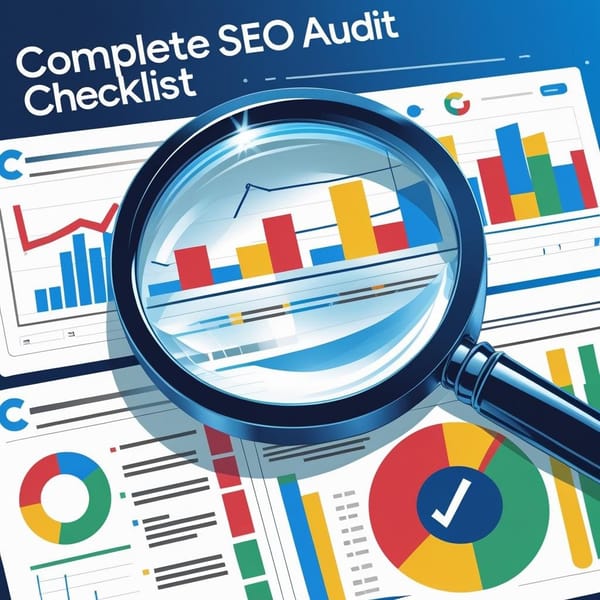SEO Career Guide (2025)
SEO Careers are booming and having SEO skills is essential for many roles today. Discover trends, growth opportunities and potential pay.

What you will find in this guide 🔽
SEO as a Career
If you're interested in a career that combines marketing, data analysis, content creation, and technology, then SEO might be just the field for you. This field attracts people who enjoy being both creative and analytical, as well as having the opportunity to be continually challenged with interesting puzzles.
One of the best things about practicing SEO is the vast opportunities for career growth and development. The most successful SEO specialists are those who stay up-to-date with industry knowledge and skills. In this field, there are always new trends to explore, the latest techniques to master, and innovative ways to approach things like optimizing content and technical site improvements.
Career Growth Outlook
While SEO is a constantly evolving landscape that requires lifelong learning, it can also be a rewarding and exciting field to work in. Companies recognize the vital role SEO plays in acquiring organic traffic, leads, and sales, which means continued growth and new specializations within the field. These growing fields utilize AI, data science, and more to constantly tweak and improve websites to get optimal visibility.
SEO professionals have the option to work at digital marketing agencies, as in-house SEO experts at companies, or as independent consultants. Some even transition their analytical abilities into other marketing disciplines, areas involving analytics, or project management roles. The multidisciplinary nature of SEO allows professionals to expand their capabilities throughout their careers.
Starting a Career in SEO
Educational Background and Skills
If you're just beginning your SEO journey, there are many educational paths you can take to get your foot in the door or enhance your existing skill set. While a degree isn't required, many SEO professionals have a background or formal education in areas like marketing, communications, journalism, or web development.
Although SEO can be learned on the job, having relevant education can establish critical baseline knowledge. Coursework in areas like digital marketing, data analytics, web design, or creative writing can help prepare you for the type of work you will perform in an SEO role.
In addition to domain expertise, certain skills are essential for success in SEO, including:
- Research & Analysis: Reviewing trends, technologies, and competitors, and analyzing site performance data to inform optimization strategies.
- Critical Thinking: Applying expertise to solve issues like keyword cannibalization, site migrations, and page speed problems.
- Creativity: Ideating engaging content and user-friendly site enhancements.
- Communication: Conveying technical recommendations to cross-functional teams and clients.
- Time Management & Project Coordination: Leading projects through each phase from audits to reporting.
Understanding your Career Options
Navigating the SEO Career Ladder
As SEO professionals gain experience and skills, they can progress to roles with greater responsibility, influence, and complexity. There are three levels of SEO career ladder:
1. Entry-Level (1-3 years)
Entry-level roles like SEO Specialist and Content Writer focus on executing tactical optimizations and creating optimized content under the guidance of senior team members. The core responsibilities include:
- On-page optimization: Optimizing title tags, meta descriptions, headings, image alt text.
- Blogging & content creation: Writing keyword-targeted articles and website copy.
- Keyword research: Using tools to analyze site search data, competition, and trends.
- Link building outreach: Researching link building opportunities and contacting websites.
- Reporting: Compiling analytics reports on SEO efforts and presenting data.
- The key skills required for entry-level roles are excellent writing abilities, attention to detail, proficiency in tools, creative thinking, and basic project management.
2. Mid-Level (3-5 years)
The mid-level includes roles like SEO Analyst, Technical SEO Lead, and Content Marketing Manager. Mid-level roles have more responsibilities, including:
- Leading SEO projects: Owning strategy, coordinating with stakeholders, and timelines.
- Optimizing site architecture: Improving internal linking structures and navigation.
- Enhancing user experience: Providing recommendations based on user behavior data.
- Performing technical audits: Running comprehensive health checks to identify issues.
- Tracking industry trends: Researching emerging topics like voice search and providing reports and recommendations on capitalizing on new opportunities.
Critical skills for mid-level roles are strategic thinking, technical abilities, budget management, analytical skills, leadership qualities, and client management abilities.
3. Senior-Level (5+ years)
Higher-up positions like SEO Manager, Head of SEO, and Director of Organic Growth oversee the full vision and execution of SEO strategies. Their focus turns to longer-term objectives, department leadership, and influencing company direction based on search data and trends. Responsibilities evolve to include:
- Developing and tracking SEO roadmaps
- Setting policies and best practices
- Mentoring and recruiting team members
- Forecasting and controlling department budgets
- Reporting on SEO performance to executives
- Identifying new revenue opportunities through SEO.
To advance to senior roles, candidates need demonstrated strategic expertise, project leadership experience, budget oversight knowledge, coaching skills, and the ability to comprehend complex search analytics.
SEO certifications can set candidates apart at every career stage by sharpening their skills and exhibiting their commitment to the field. Leading programs are offered by educational institutions like the University of California Davis.
Expanding Your Marketing Skills Beyond SEO
While focusing on a career as an SEO practitioner may be a rewarding path, many professionals broaden their capabilities over time to related marketing disciplines.
The skills cultivated in SEO roles, such as data-driven analysis, research, and creativity, have transferable value across integrated digital marketing teams. SEO professionals work closely with content marketing, PPC, web analytics, UI/UX, and more.
Here are some common transitions from a pure-SEO role to other marketing disciplines
Content Marketing: Leverage writing expertise to create high-quality blog posts, guides, and interactive content that engages audiences well beyond search traffic.
PPC: Apply analysis of high-value keywords, user intent, and optimization techniques when managing paid search and shopping campaigns.
Web Analytics: Use expertise in extracting insights from site performance data into broader business intelligence roles.
UI/UX Design: Inform user experience design improvements with site visitor behavior patterns uncovered through SEO analysis.
Social Media Marketing: Bring SEO keyword and topic research proficiency to craft targeted social content and ads.
Public Relations: Pitch and secure earned media placements by creating newsworthy, engaging content; Build relationships.
Expanding your skillset has benefits such as:
- Becoming a versatile marketer able to serve broader roles.
- Understanding how SEO connects to overall business goals.
- Gaining insight into integrated marketing strategies.
- Increasing value as a marketing leader, strategist, and innovator.
The world of marketing is vast, and SEO professionals can exponentially increase their value by using SEO as a launchpad to other specialties. A diversified, versatile digital marketing skill set delivers the flexibility to thrive even as trends evolve.
Exploring Different SEO Work Environments
SEO professionals have the flexibility to work in different environments, such as digital marketing agencies, in-house marketing teams, or as independent consultants. Understanding the differences in work pace, project diversity, and career development opportunities can help SEO practitioners find the best fit for their skills, interests, and lifestyle.
Freelance SEO
Freelancing offers entrepreneurs ultimate schedule flexibility and discretion over client projects. As demand for SEO specialists grows, freelancers stand to command handsome fees. They gain broad exposure optimizing websites across diverse industries. However, freelancing involves managing all client acquisition, project scope, taxes and self-marketing alone.
In-House SEO
In-house SEO specialists enjoy stability, corporate benefits, and close alignment to business goals as members of a marketing team. They also have the opportunity to deepen their expertise within a particular industry. However, managing SEO for just one company can present limitations in terms of career development learning opportunities.
Agency SEO
Working at an agency provides a fast-paced, stimulating environment where you can gain experience across diverse clients and projects. However, agency work can involve tight deadlines and occasional long hours as you work to satisfy client KPIs. Success in this field requires top-notch client management abilities.
Career Development & Growth
Sharpening Your SEO Skillset
With search algorithms and best practices constantly evolving, dedication to continuous SEO education is imperative for success. Professionals should invest in steadily developing abilities across technical competencies, content creation, and soft skills.
Staying Updated
It is critical for SEO success to stay on top of Google algorithm updates, rising search trends, new datasets and platforms impacting performance. Tips include
- Following experts on LinkedIn and engaging with their content
- Subscribing to relevant newsletters
- Read industry blogs (I recommend Moz, Search Engine Journal, Search Engine Land)
- Attend networking events and conferences (even online!)
- Join industry groups, discussion forums and communities (Reddit SEO, Women in Tech)
Technical Skills
Having competency in areas like Google Analytics, Google Search Console, XML sitemaps, structured data markup, page speed optimization and A/B testing allows SEOs to accurately diagnose opportunities and implement enhancements effectively.
Content Expertise
Writing engaging, keyword-optimized, high-quality content that users love and Google ranks well requires its own evolving skillset to stay competitive.
Soft Skills
Since SEO success hinges on collaborating with stakeholders across marketing, product development, UX and leadership, soft skills like communication, emotional intelligence, influence and strategic thinking differentiate great performers.
By continually expanding capabilities across technical, content and interpersonal realms, SEO professionals position themselves to better lead optimization initiatives and advance their careers.
Where SEO Job Growth is Heating Up
SEO is one of those specializations that is needed in just about every business type and industry. However, there are certain trends and patterns where SEO is growing rapidly, and are good to keep an eye on.
Technology & SaaS
- Startups trying to disrupt through organic marketing
- B2B software companies publishing gated assets to capture leads
- Mobile apps requiring strong app store optimization (ASO)
Relevant Skills: Technical SEO, optimizing developer documentation, ASO, aggregating software reviews
Healthcare
- Hospitals expanding content marketing to attract patients
- Telehealth platforms needing discoverability
- Biotech using SEO to educate and market to physicians
Relevant Skills: Healthcare SEO vocabulary and messaging, reputation management, local listing optimization
Finance
- Banks and credit unions boosting online loan marketing
- Fintech apps requiring user acquisition
- Accounting firms publishing thought leadership content
Relevant Skills: Optimizing complex financial products in a compliant way, advanced Excel and data skills
Education
- Coding bootcamps and MOOCs promoting programs
- Public school systems needing digital community engagement
- Universities using SEO to stand out and attract applicants
Relevant Skills: Optimizing educational materials, outreach to influencers, Schema optimization and EEAT knowledge.
Real Estate
- Brokers and property tech growing web traffic to listings
- Complex long-tail location-based keyword targeting
- Visual SEO for properties
Relevant Skills: Location page optimization, optimizing photos/videos, XML sitemaps
E-Commerce
- Online retailers fighting for product discoverability
- Comparison shopping engines looking to monetize traffic
- Mainstream adoption of conversational commerce
Relevant Skills: Technical SEO, product schema markup, dealing with complex site hierarchies and data sets.
Job openings at leading digital disruptors in these sectors offer incredible environments to specialize while shaping business success through SEO. Opportunities abound for motivated SEO practitioners to target these thriving industries.
The Future of SEO Careers
The future of search engine optimization (SEO) is getting more exciting with the emergence of new trends such as artificial intelligence, voice search, augmented reality and automation. These trends will shape the next generation of SEO strategy and provide new opportunities for businesses.
The upcoming opportunities include:
- Conversational SEO: Optimizing for voice search on smart speakers and virtual assistants using natural language optimization.
- Visual SEO: As users are turning more and more to video platforms, enhancing image and video findability through metadata, captions, and transcriptions and more will become more important.
- Personalization: Providing custom experiences for visitors based on interests and context.
- Automation: Using AI and machine learning to scale campaigns and surface deeper insights.
- Platform specific SEO expertise: Optimizing for the search algorithms of specific platforms. This includes areas like mobile app optimization, or specific social media platforms.
As these emerging capabilities mature, SEO professionals have tremendous opportunities to lead adoption within their companies. They can do this by researching how innovations apply to their business models and audiences, running small-scale pilot experiments to showcase potential value, advocating passionately for prioritization based on competitive dynamics, and implementing new optimizations and measuring quantified impact over time.
Staying on the cutting edge allows forward-thinking SEO practitioners to position themselves as true digital marketing leaders within their organizations. They can help usher in smarter strategies leveraging automation, personalization, and conversational experiences to acquire, engage, and delight searchers.
The future of search is full of potential, and savvy SEOs will steer their careers to new heights by riding these rising waves early on.
Pay and Perks
SEO salaries reflect practitioners’ experience level, location, company size, industry and remote work flexibility. Yet across the board, competitive SEO compensation is rising with explosive demand for talent.
I analyzed over 100 locations, companies hiring SEOs and more to put together a list of findings for pay and benefits in 2025.
To keep results even, these are for mid-level roles under the title “SEO Manager” or “SEO Specialist” with 3-5 years of experience
Location
US: SEOs earn higher pay at tech hubs and major metros. San Francisco offers a median salary of $128,000. New York City ($117,000), Los Angeles ($110,000) and Austin ($97,000) also boast strong SEO pay.
Smaller markets see lower ranges where metros like Phoenix and Kansas City sees a median of $67,000, Raleigh, $87,000 and Cleveland $91,000.
Europe: European regions will differ based on metro area but in general, latest numbers seem to see a relatively even trend across regions and countries in their native currencies. London, median of £47,000 Berlin, a median of €53,000 and Stockholm, SEK 40,000/mo
Perks also differ widely between the US and other countries, especially in areas of vacation days, parental leave and medical coverage.




